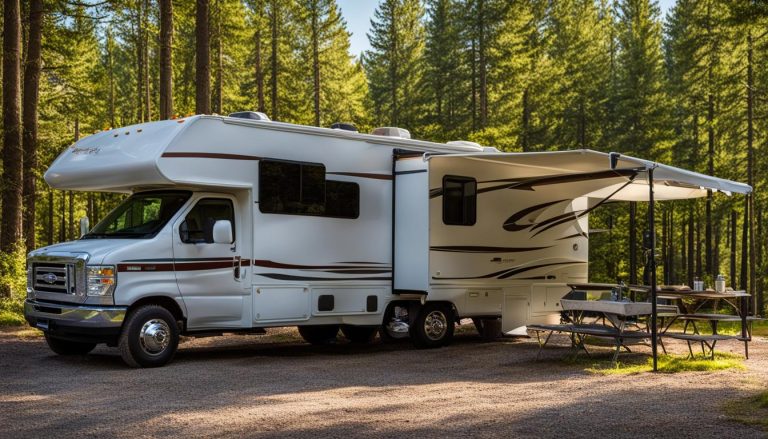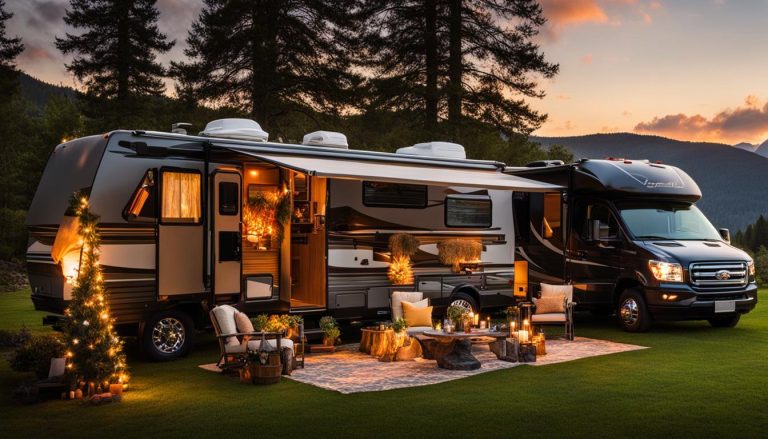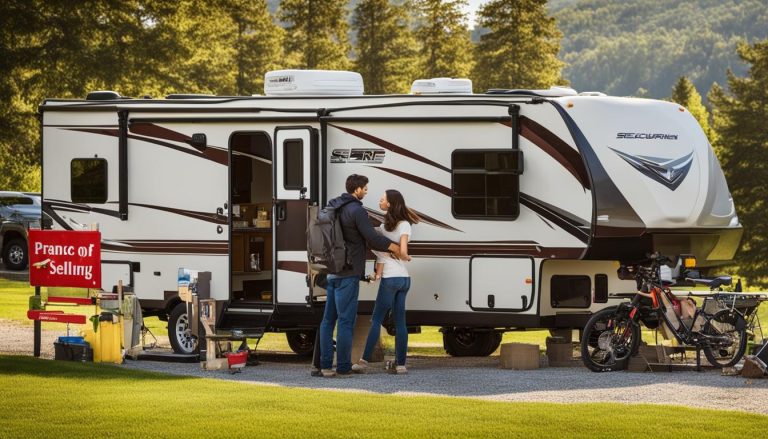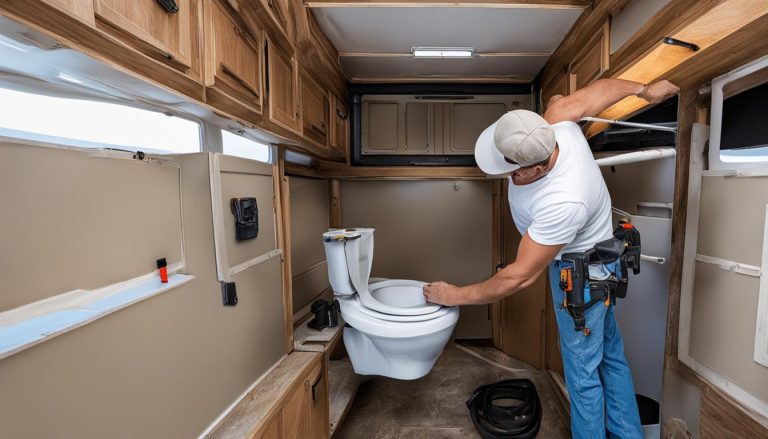Power Your RV Hassle-Free: A Simple Guide
gorvlifestyle.com and its partners may earn a commission if you purchase a product through one of our links
When it comes to powering your RV off-grid, you have several options to consider. You no longer have to rely solely on traditional methods like gas generators or on-grid connections and hookups. The advancements in technology have introduced more sustainable and convenient alternatives that can make your RV adventures even more enjoyable and eco-friendly.
One of the most popular and reliable options is the use of portable solar generators. These generators harness the power of the sun, converting it into usable energy to power your RV. They are a sustainable and cost-effective solution, offering noise-free operation and reducing your carbon footprint. With portable solar panels, you can easily recharge your generator while on the go, making it a hassle-free power source for your RV.
Another option to consider is integrated solar power generation systems. These systems are part of your RV itself and offer a comprehensive solution for off-grid power. They typically consist of solar panels, a charging unit, a battery pack, and an inverter. With an integrated system, you can run all your appliances and lighting without any worry. Plus, with plug-and-play Power Kits now available, you have the flexibility to customize and expand your solar power setup as needed.
For those looking for alternative energy sources, small wind turbines can be a viable option for powering your RV on the move. When combined with solar panels, these turbines can generate electricity while your vehicle is in motion. While they may have limitations in terms of power generation capacity and installation complexity, they offer an additional source of off-grid power that complements solar energy.
Understanding your energy needs is crucial when determining the right power source for your RV. Factors like battery capacity, power consumption of appliances, and the duration of your off-grid trips all play a role. By exploring the various power options available and considering the pros and cons of each, you can make an informed decision that suits your specific requirements and preferences.
So, whether you choose to power your RV with a portable solar generator, an integrated solar power generation system, or a combination of different sources, you can enjoy the freedom of off-grid living while minimizing your environmental impact. It’s time to embark on unforgettable adventures with hassle-free RV power!
Key Takeaways:
- Portable solar generators are a sustainable and eco-friendly way to power your RV off-grid.
- Integrated solar power generation systems offer a comprehensive power solution for your RV, allowing you to run all appliances and lighting.
- Small wind turbines can be an alternative power source, especially when combined with solar panels.
- Understanding your energy needs is crucial in choosing the right power source for your RV.
- Consider the pros and cons of each option before making a decision.
Gas Generators: Portable and Onboard Options
Gas generators have long been the standard for powering RVs. They provide reliable power and come in both portable and onboard options to suit your needs. Let’s explore the features and considerations of each:
Portable Gas Generators
Portable gas generators offer versatility and can be used in various locations. They are compact and easy to transport, allowing you to bring power wherever you go. These generators typically run on gasoline and provide a convenient solution for RV power supply. However, there are a few factors to consider:
- Size and Weight: Portable gas generators can be bulky and heavy, making them less suitable for RV owners with limited storage space.
- Fuel Consumption: Gasoline generators require regular refills, especially during extended off-grid trips.
- Noise Levels: Gas generators can be noisy, which could affect your camping experience or disturb neighboring campers.
- Environmental Impact: Gasoline emissions contribute to air pollution and may not align with eco-friendly off-grid practices.
While portable gas generators remain a popular choice, they may not be ideal for RV owners seeking a quiet, sustainable power solution.
Onboard Gas Generators
Onboard gas generators are another option for powering your RV. These generators draw fuel from the RV’s chassis fuel tank or use a separate onboard fuel tank or propane system. Here are some considerations when it comes to onboard gas generators:
- Convenience: Onboard generators provide a dedicated power source within your RV, eliminating the need for separate equipment.
- Installation: Depending on your RV’s setup, it may require professional installation to integrate an onboard generator.
- Fuel Capacity: Onboard generators with built-in fuel tanks offer extended runtimes, reducing the need for frequent refills.
- Maintenance: Onboard gas generators require regular maintenance to ensure optimal performance and reliability.
Onboard gas generators offer a seamless power supply solution for your RV, but it’s important to assess the specific needs of your RV and consider the noise levels and environmental impact associated with this option.
| Pros | Cons |
|---|---|
| Convenient and integrated power source | Bulky and heavy |
| Extended runtime with onboard fuel tanks | Noisy operation |
| Negligible environmental impact with propane systems | Regular maintenance required |
As with any power source, it’s essential to weigh the pros and cons and consider your specific needs before choosing between portable and onboard gas generators.
Portable Solar Generators: Sustainable Energy Source
When it comes to powering your RV off-grid, portable solar generators are an excellent and sustainable solution. These generators harness the energy of the sun and convert it into usable power, allowing you to enjoy a cost-effective and eco-friendly way to meet your energy needs.
Portable solar generators offer a range of advantages that make them an attractive choice for RV owners. First and foremost, they provide significant cost savings in the long run. Once you invest in a portable solar generator, you can take advantage of free and abundant solar energy, reducing or eliminating the need to rely on traditional power sources.
Another major benefit of portable solar generators is their noise-free operation. Unlike gas generators, which can be noisy and disruptive, solar generators operate silently, allowing you to enjoy a peaceful and serene RV experience. This is particularly important if you prefer a quiet and relaxing environment during your off-grid adventures.
Furthermore, using portable solar generators helps to reduce your carbon footprint and contribute to a cleaner, greener planet. By harnessing the power of the sun, you can enjoy your RV adventures while minimizing the environmental impact. This aligns perfectly with the growing trend of eco-conscious travel and sustainable living.
Portable solar generators come in various capacities and sizes, allowing you to choose the one that best suits your energy needs. They can be easily recharged using small solar panels, making them a convenient and hassle-free power solution for RV owners. Some models even offer the option to add extra battery packs and portable solar panels, enhancing their charging capabilities and providing even more flexibility.
Let’s take a closer look at the advantages of portable solar generators:
- Cost savings from utilizing free solar energy
- Noise-free operation for a peaceful RV experience
- Reduced carbon footprint for a greener lifestyle
- Various capacities and sizes to suit individual energy needs
- Easy recharging using small solar panels
The Future is Solar-Powered
As the world becomes increasingly concerned about environmental sustainability, portable solar generators are emerging as a popular choice for RV power solutions. They offer a reliable and sustainable way to meet your energy needs while minimizing the impact on the planet.
With advancements in solar technology, portable solar generators are becoming more efficient, affordable, and user-friendly. They provide a practical and convenient solution for RV owners who want to enjoy the freedom of off-grid living without sacrificing comfort.
Whether you’re boondocking in remote locations or simply looking to reduce your reliance on traditional power sources, a portable solar generator is a smart investment. It provides a reliable and eco-friendly energy source, allowing you to power your RV sustainably and embrace the beauty of off-grid adventures.
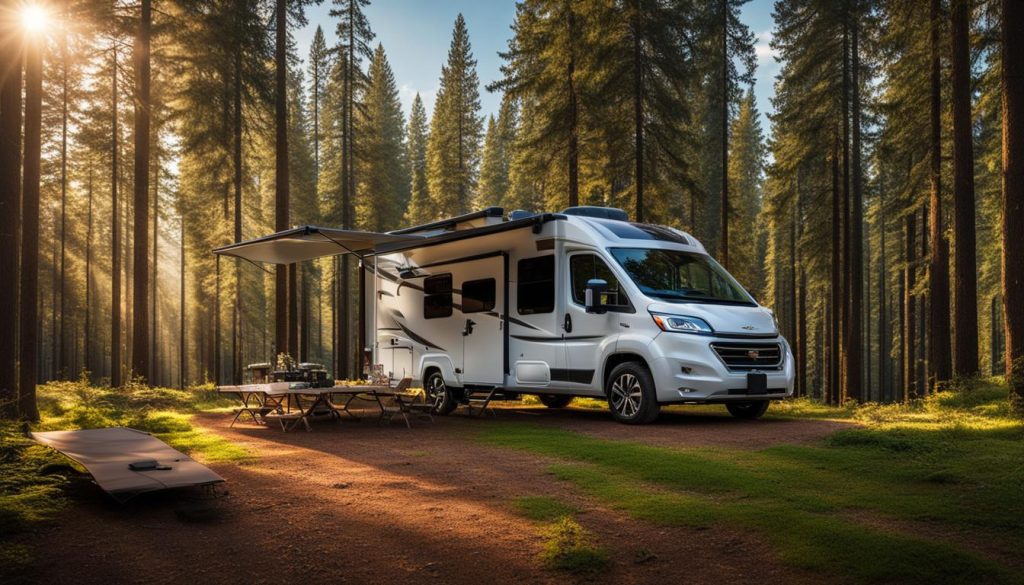
To illustrate the multiple benefits of portable solar generators, here’s a comparison table highlighting the advantages:
| Advantages | Gas Generators | Portable Solar Generators | Integrated Solar Power Generation Systems | Small Wind Turbines |
|---|---|---|---|---|
| Noise Level | Noisy | Completely silent | Completely silent | Noisy |
| Environmental Impact | Emissions | Zero emissions | Zero emissions | Emissions |
| Cost | Regular fuel costs | No fuel costs | No fuel costs | Regular fuel costs |
| Installation | Simple | Plug-and-play | Professional installation required | Professional installation required |
Integrated Solar Power Generation Systems: Full RV Power Solution
When it comes to powering your RV off-grid, integrated solar power generation systems offer a comprehensive solution. These systems are designed to be an integral part of your RV and require modifications to install. With a combination of solar panels, a charging unit, a battery pack, and an inverter, these systems provide a reliable and sustainable source of power for your entire RV.
Professionally installed solar systems can be fixed and difficult to customize. However, there are now compact and modular solar power solutions specifically designed for RVs. These Power Kits are plug-and-play, making them easy to install and customize according to your power needs. You can even stack additional batteries and solar panels to maximize your RV’s power capacity.
With an integrated solar power generation system, you can enjoy the benefits of off-grid living without compromising on comfort. Power your appliances, lighting, and other electrical systems while reducing your reliance on traditional power sources. Say goodbye to noisy generators and hello to a quiet and environmentally friendly power solution.
The Benefits of Integrated Solar Power Generation Systems
- Reliable and consistent power supply for all your RV’s electrical needs
- Noise-free operation, allowing for a peaceful off-grid experience
- Environmentally friendly, reducing your carbon footprint
- Flexibility and customization options with modular Power Kits
- Reduced reliance on gas generators or on-grid power hookups
Integrated solar power generation systems offer a convenient and sustainable way to power your RV off-grid. With the ability to run all your electrical systems and appliances, you can enjoy the comforts of home while embracing the freedom of off-grid living.
Small Wind Turbines: Power on the Move
When it comes to off-grid power options for RVs, small wind turbines offer an alternative solution, especially when combined with solar panels. These compact systems can be attached to the back of your RV, harnessing the power of the wind to generate electricity while you’re on the move.
Unlike gas generators or solar panels that require sunlight, wind turbines can provide power regardless of the weather conditions. They are particularly useful in areas with strong and consistent winds, making them a reliable source of off-grid power.
However, it’s important to note that small wind turbines have limited power generation capacity compared to other options. They are typically used in conjunction with solar panels to offset any limitations and ensure a steady power supply.
While wind turbines offer an eco-friendly and sustainable way to power your RV, they are not as commonly adopted by RV owners as solar generators or integrated solar power systems. This is due to the relatively more complex installation and maintenance processes involved. The positioning and alignment of the wind turbine are crucial for optimal performance, and periodic maintenance is required to keep the system running smoothly.
Table: Pros and Cons of Small Wind Turbines
| Pros | Cons |
|---|---|
| Reliable off-grid power in areas with strong and consistent winds | Limited power generation capacity compared to other options |
| Environmentally friendly and sustainable | More complex installation and maintenance process |
| Can be used in conjunction with solar panels for a hybrid power setup | Less commonly adopted by RV owners |
Note: The pros and cons mentioned here are based on general considerations and may vary depending on the specific wind turbine model and location.
While wind turbines may not be as popular as other RV power options, they can be a viable choice for those seeking to maximize power generation and reduce reliance on conventional energy sources.
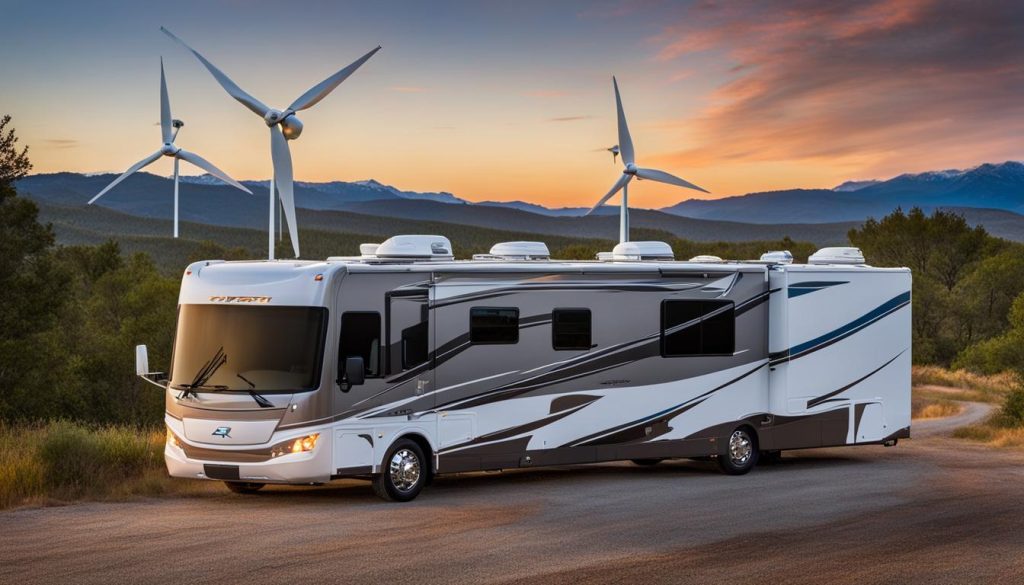
Understanding Energy Needs: Calculating Required Power
When powering your RV off-grid, it’s essential to understand your energy needs. Factors such as battery capacity, power consumption of appliances, duration of off-grid trips, and environmental conditions all play a role in determining how much power you require.
One useful tool that can help you accurately estimate your power needs is an energy calculator. These calculators take into account the wattage and usage duration of each appliance in your RV, providing you with an estimate of the total energy consumption.
Calculating Energy Consumption
Energy calculators are designed to simplify the process of determining your RV’s energy requirements. By inputting the wattage and average usage time of each appliance, you can quickly calculate the total energy consumption. This allows you to plan and manage your power supply effectively.
Here is a step-by-step guide to using an energy calculator:
- Make a list of all the appliances and devices you use in your RV, including lights, electronics, kitchen appliances, and HVAC systems.
- Find the wattage rating of each appliance. This information is usually listed on the device’s label or in the user manual.
- Estimate the average daily usage time for each appliance. Consider your typical usage patterns and adjust accordingly.
- Input the wattage and usage time into the energy calculator to obtain the daily energy consumption for each appliance.
- Add up the total daily energy consumption to determine your RV’s overall power needs.
By using an energy calculator, you can gain a comprehensive understanding of your RV’s power requirements, ensuring you have enough energy to support your off-grid adventures.
Optimizing Energy Usage
In addition to calculating your energy needs, there are several ways to optimize energy usage and reduce power demands in your RV:
- Implement temperature control measures such as proper insulation, weatherstripping, and using shades or blinds to regulate heat.
- Choose energy-efficient appliances and gadgets that consume less power without compromising performance.
- Upgrade to high-efficiency lighting options, such as LED bulbs, to significantly reduce electricity usage.
- Consider investing in energy management systems that monitor and control power consumption, allowing you to identify energy-hungry appliances and make adjustments accordingly.
By incorporating these energy-saving practices, you can maximize the longevity of your power supply and minimize reliance on external sources.
Understanding your RV’s energy needs is crucial for successful off-grid living. By calculating your power requirements and optimizing energy usage, you can ensure a reliable and sustainable power supply for all your adventures.
Pros and Cons of Different Power Sources
When it comes to powering your RV off-grid, there are various options to consider. Each power source has its own advantages and considerations. Understanding the pros and cons of these power sources will help you make an informed decision for your RV.
Gas Generators
Pros:
- Reliable and flexible power source
- Can be used in various locations
- Provides immediate power
Cons:
- Noisy operation
- Environmentally unfriendly
- Requires refills and maintenance
| Gas Generators | Portable Solar Generators | Integrated Solar Power Generation Systems | Small Wind Turbines | |
|---|---|---|---|---|
| Reliability | ✓ | ✓ | ✓ | ✓ |
| Flexibility | ✓ | ✓ | ✓ | ✗ |
| Noise Level | High | Quiet | Quiet | Low |
| Environmental Impact | High | Low | Low | Medium |
| Weather Dependence | Not Dependent | Dependent | Dependent | Dependent |
| Customizability | Limited | Limited | Less Customizable | Limited |
| Power Capacity | ✓✓✓ | ✓ | ✓✓ | ✓ |
Portable Solar Generators
Pros:
- Sustainable and eco-friendly power source
- Quiet operation
- Cost-effective in the long run
Cons:
- Dependent on weather conditions
- Less power generation on cloudy days
- May require additional solar panels for faster charging
Integrated Solar Power Generation Systems
Pros:
- Provides a complete power solution for RVs
- Allows running all appliances and lighting
- Reduced reliance on external power sources
Cons:
- May be less customizable compared to other options
- Requires professional installation and modifications to the RV
- Higher upfront cost
Small Wind Turbines
Pros:
- Provides power on the move
- Can complement solar panels for power generation
Cons:
- Installation and maintenance can be more complex
- Limited power generation capacity
- Not as commonly adopted by RV owners
Weight the pros and cons of each power source for your RV. Consider your specific needs, preferences, and budget before making a decision. Remember, there is no one-size-fits-all solution, and the right power source depends on your individual requirements.
Next, we’ll delve into understanding your energy needs and how to calculate the required power for your RV.
Conclusion: Harnessing Off-Grid Power for RV Adventures
Powering your RV off-grid opens up a world of possibilities for exploration and adventure. Whether you’re embarking on a road trip or seeking a peaceful getaway in nature, having reliable power options for your RV is essential. Fortunately, there are various ways to meet your energy needs while living off-grid.
By understanding your specific energy requirements and researching different power sources, you can make an informed decision that aligns with your needs and values. Traditional gas generators offer reliability and flexibility, but they may not be the most environmentally friendly option. On the other hand, sustainable alternatives like portable solar generators and small wind turbines provide a more eco-friendly solution.
Whether you choose a portable solar generator for its cost savings and easy rechargeability, an integrated solar power system for a comprehensive off-grid solution, or a combination of multiple power sources, you can enjoy the comforts of home while respecting the environment. With advancements in off-grid power technology, it’s now easier than ever to power your RV hassle-free and embrace unforgettable off-grid journeys.
So, don’t limit your RV adventures to traditional power options. Explore the abundant RV power options available today and embark on off-grid journeys that take you to the heart of nature without sacrificing comfort and convenience.
FAQ
What are the options for powering an RV off-grid?
You can power your RV off-grid using gas generators, portable solar generators, integrated solar power generation systems, or small wind turbines.
What are the advantages and considerations of using gas generators?
Gas generators provide reliable power and are available in both portable and onboard options. However, they can be noisy, environmentally unfriendly, and require refills.
How do portable solar generators work?
Portable solar generators harness the energy of the sun and convert it into usable power, offering cost savings, noise-free operation, and a reduced carbon footprint.
What are integrated solar power generation systems?
Integrated solar power generation systems are part of the RV itself and include solar panels, a charging unit, a battery pack, and an inverter. They offer a full RV power solution, but customization may be limited.
Can small wind turbines power an RV?
Small wind turbines can provide power to an RV while it’s in motion. However, their power generation capacity is limited, and they are often used in combination with solar panels.
How can I calculate my RV’s energy needs?
You can estimate your energy consumption by using energy calculators that take into account factors such as battery capacity, appliance power consumption, off-grid trip duration, and environmental conditions.
What are the pros and cons of different power sources for RVs?
Gas generators offer reliability and flexibility but can be noisy and environmentally unfriendly. Portable solar generators provide sustainable and eco-friendly power but are weather-dependent. Integrated solar power systems offer a complete solution but may be less customizable. Small wind turbines provide power while on the move but have limited capacity.
How can I power my RV off-grid for unforgettable adventures?
By exploring the different power sources available, understanding your energy needs, and considering the pros and cons, you can choose the right power source for your RV and enjoy the comforts of home while respecting the environment and embracing off-grid living.

